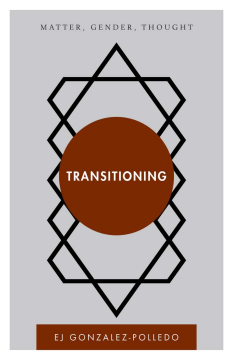
Additional Information
Book Details
Abstract
Transitioning: matter, gender, thought takes the body, its ontologies and temporalities, as a primary ethnographic heuristic to explore transition contexts, relations and life processes. Although in Britain the Gender Recognition Act has, since 2004, provided a framework for identity recognition for those who seek to live as a member of the opposite gender, this book draws on trans men’s experiences to conceptualise transition outside this framework. Thinking through changing materialities, cultures and epistemologies of transition, the book brings together perspectives in anthropology, transgender studies, and social theory to think through how bodies happen, and the scales, assemblages, transmissions and indeterminacies in their process of becoming something other than themselves.
This dance of concepts weaves it way through several narratives of transitioning FTM men to create a terrain that resists any simple cartography. Neither map nor guide, this book takes equally seriously the gender of those for whom re-embodiment is a resting place and of those for whom everything is still open.
Marilyn Strathern, Professor, University of Cambridge
EJ Gonzalez-Polledo is Lecturer in the Faculty of Social Sciences at the University of Sheffield.
In this conceptually and ethnographically rich exercise in thinking "with" transgender rather than thinking "about" transgender, EJ Gonzalez-Polledo explores how "transitioning" is not something only trans people do in the process of moving away from their birth-assigned sex. It is something that all materiality does--perpetually, inexorably, unavoidably--in the ever-unfolding dynamic processes of being. Gonzalez-Polledo superbly demonstrates in Transitioning how manifesting this ontological flux can be a danger trans people face when they destablize gender for others, as well as a gift they give that can open the world in profound and unexpected ways. Read this book if you've ever wondered how deep the transgender rabbit-hole can go.
Susan Stryker, co-editor of TSQ: Transgender Studies Quarterly and Associate Professor of Gender and Women's Studies at the University of Arizona
Transitioning: Matter, Gender, Thought, by EJ Gonzalez-Polledo, is an important and provocative book. Drawing on several years of research in the London trans community, the book is in part a review and critique of the existing theoretical literature on gender and sexuality, biology and culture, and models and lived in worlds, and in part a sensitive and vivid ethnographic account of experiences of transition. Theoretically both very imaginative and solidly grounded, the discussion moves through personhood and agency, the imagined worlds that encompass many transitions, and the biomedical and social models which try to categorise and regulate these. This provides insight to the social, political and ideological considerations which provide the frame for much of the discussion and debate around transsexual transition. Transition, Gonzalez-Polledo argues, is not a lineal and finite process, but a way of being and becoming which is always potentially transient. It is a powerful argument, and one that could be used fruitfully in considering all kinds of transitions, not only transsexual ones. The beauty of this book lies in the author’s engagement with both theory and ethnography. The space between its broad and impressive theoretical sweep and its focus on the miniscule detail of personal life stories and narratives could be insurmountable, and yet Gonzalez-Polledo makes them speak to each other. There have been many arguments about whether anthropology should be theory driven or ethnographically led. This book achieves a brilliant balance between the two domains, always insisting on the relation between the two. In the end, of course, the reader realizes that both ethnography and theory are themselves objects of intellectual scrutiny; in a sense, they become the processes they describe. Transitioning should be read by everyone interested in gender, sexuality and the body, by all those teaching courses on gender and the body, and by everyone trying to navigate their way through what is often the minefield of contemporary social theory.
Frances Pine, Reader in Anthropology, Goldsmiths, University of London
Table of Contents
| Section Title | Page | Action | Price |
|---|---|---|---|
| Transitioning | Cover | ||
| Contents | v | ||
| Acknowledgements | vii | ||
| 1 Transition Inside Out | 1 | ||
| 2 T: Informed Material | 47 | ||
| 3 Counternarrative | 85 | ||
| 4 Thresholds: Gender in the Wild | 123 | ||
| 5 Assembling Transition | 155 | ||
| References | 193 | ||
| Index | 221 |
